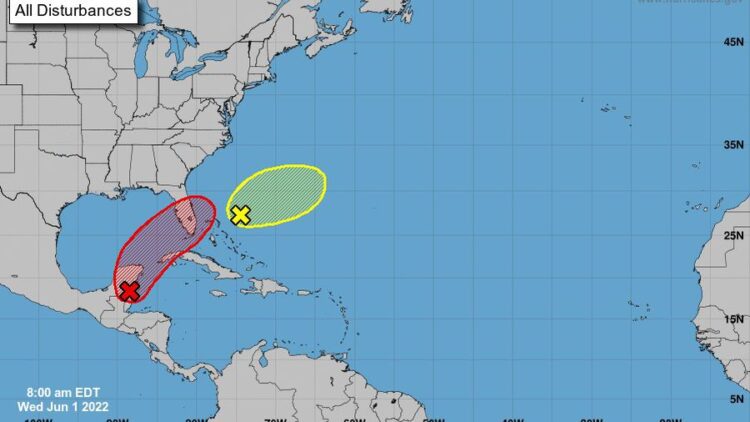Where Will Hurricane Agatha Strike Next? A Look at its Path.

As the world continues to grapple with the COVID-19 pandemic, another natural disaster looms on the horizon – Hurricane Agatha. This powerful storm has already wreaked havoc in several countries, leaving a trail of destruction in its wake. With its unpredictable path and intensity, many are left wondering where it will strike next and how severe the impact will be. In this article, we will take a closer look at Hurricane Agatha’s path, the destruction it has caused so far, and what we can expect in the future. Join me as we explore this powerful force of nature and its potential impact on our world.
What is Hurricane Agatha?
Hurricane Agatha is a powerful storm that has been making headlines in recent days. It is a tropical cyclone that has formed over the Atlantic Ocean and is currently moving towards land. The storm has been classified as a Category 4 hurricane, which means it has sustained winds of up to 130 miles per hour.
The formation of Hurricane Agatha was caused by warm ocean waters and low wind shear conditions. These factors allowed for the storm to intensify quickly and become a major threat to coastal communities. As the storm continues to move towards land, experts are closely monitoring its path and predicting where it will make landfall next. With its destructive force, Hurricane Agatha serves as a reminder of the power of nature and the importance of being prepared for natural disasters.
The Path of Hurricane Agatha
As Hurricane Agatha continues to gain strength, many people are wondering where it will strike next. The path of a hurricane can be unpredictable, but meteorologists have been tracking Agatha’s movements closely.
Currently, Hurricane Agatha is moving northwest through the Caribbean Sea towards the Gulf of Mexico. It has already caused significant damage in parts of Central America and Mexico, with heavy rains and flooding leading to landslides and evacuations.
The National Hurricane Center predicts that Hurricane Agatha will continue on its current path towards the Gulf Coast of the United States. However, it is important to note that hurricanes can change direction or intensity quickly, so it is crucial for those in potentially affected areas to stay informed and prepared.
Overall, the path of Hurricane Agatha remains uncertain, but one thing is certain: it has already caused significant destruction and has the potential to cause even more.
The Destruction Left in Hurricane Agatha’s Path
As Hurricane Agatha continues to make its way through the Caribbean and Central America, the destruction left in its path is becoming more apparent. The powerful storm has already caused widespread flooding, landslides, and power outages in several countries, including Guatemala, Honduras, and El Salvador.
In Guatemala alone, over 100 homes have been destroyed and at least four people have lost their lives due to the storm. In Honduras, thousands of people have been forced to evacuate their homes as rivers overflowed their banks and entire communities were submerged under water. And in El Salvador, where Hurricane Agatha made landfall on May 29th, the storm caused significant damage to infrastructure and agriculture.
The aftermath of Hurricane Agatha serves as a stark reminder of the devastating impact that natural disasters can have on vulnerable communities. As we continue to track the path of this powerful storm, it is important that we come together to support those who have been affected by its destructive force.
The Aftermath of Hurricane Agatha
After Hurricane Agatha has passed, the aftermath can be devastating. The destruction left in its path can be seen for miles and the impact on people’s lives is immeasurable. Homes and businesses are destroyed, power lines are down, and roads are blocked by debris. The aftermath of a hurricane is a time for communities to come together to support one another.
The recovery process after Hurricane Agatha can take months or even years. People may have lost everything they own and need help rebuilding their homes and businesses. Emergency services will work tirelessly to restore power and clear roads so that people can start to rebuild their lives. It is important for those who were not affected by the hurricane to offer support in any way they can, whether it be through donations or volunteering their time.
The aftermath of Hurricane Agatha is a reminder of the power of nature and the importance of being prepared for natural disasters. It is crucial for individuals and communities to have emergency plans in place so that they can respond quickly when disaster strikes. While the aftermath of a hurricane can be overwhelming, it also provides an opportunity for people to come together and support one another during difficult times.
The Future of Hurricane Agatha
As Hurricane Agatha continues to wreak havoc in its path, many are left wondering what the future holds for this powerful storm. While it is impossible to predict with certainty where Agatha will strike next, meteorologists are closely monitoring its movements and providing updates as they become available.
One thing that is certain is that we must continue to prepare for the worst-case scenario. This means staying informed about the latest developments and heeding any evacuation orders that may be issued. It also means taking steps to protect our homes and businesses from potential damage, such as securing loose objects and reinforcing windows and doors.
Ultimately, the future of Hurricane Agatha remains uncertain. But by remaining vigilant and taking proactive measures, we can minimize the impact of this devastating storm on our communities and ensure that we are prepared for whatever lies ahead.
Conclusion
In conclusion, Hurricane Agatha has left a trail of destruction in its path, affecting the lives of millions of people. As we continue to monitor its movements, it is important to remember that this is not just a natural disaster but a human one as well. The aftermath of Hurricane Agatha will require significant resources and support from governments and aid organizations to help those affected rebuild their homes and communities. It is also crucial that we take steps to mitigate the effects of climate change, which has been linked to the increasing frequency and intensity of hurricanes like Agatha. By working together, we can ensure that our planet and its inhabitants are better prepared for future disasters.






